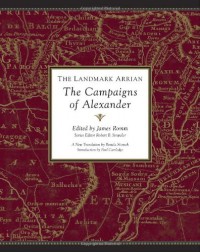 Another phenomenal production by the Landmark series. The book’s ample maps, footnotes and side summaries provide the modern reader invaluable assistance in context and locations.
Another phenomenal production by the Landmark series. The book’s ample maps, footnotes and side summaries provide the modern reader invaluable assistance in context and locations. Arrian, who’s name may be familiar as the student of Epictetus who compiled the stoic’s teachings in The Discourses, provides a chronological history of Alexander’s conquests approximately 400 years after. With an engaging cadence, he carries the reader with him from Alexander’s rise to his death. Unquestionably, Arrian is an admirer of the Macedonian general. His history is undeniably whitewashed but he still strives to relay accurate sources. When his sources conflict, he mentions so. Arrian relied heavily on Ptolemy’s account as the foundation of his work.
As the title suggests, The Campaigns of Alexander is a military history. Though the tactics of troop movements are not as internally consistent as historians would prefer, the general movement of the Greek troops is detailed. The numerous appendices provide excellent analysis on the formation of Alexander’s army, as well other contextual explanations, to give the reader a fighting chance to truly understand this ancient classic.
Unlike historians such as Herodotus and Thucydides, Arrian’s writing does not get bogged down in trivialities. Welcome anecdotes are interspersed, but the outrageous (though colorful) tangents found in Herodotus are avoided as well as the ponderous details found in Thucydides. The Campaigns of Alexander has historical significance. It is rightly considered an ancient classic. But I recommend this book because, between the superb editing choices and Arrian’s own writing, it is a great read.




